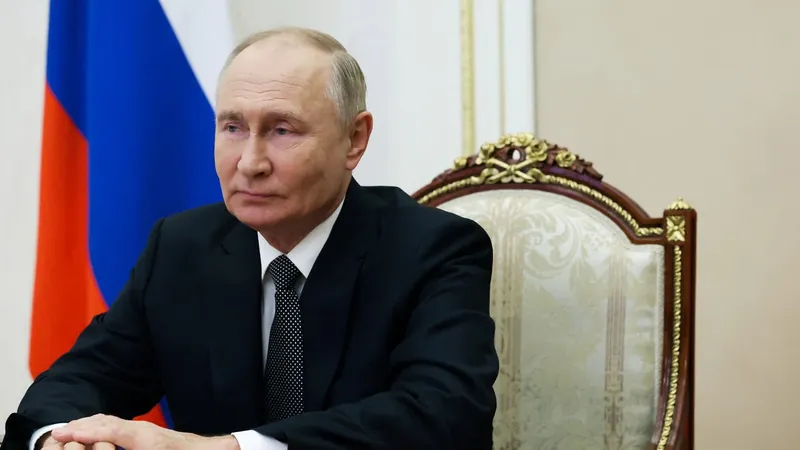
Are We on the Brink? Putin's Nuclear Warning Sends Shockwaves Through the West!
2024-09-27
Putin's Chilling Warning
In a bold and chilling statement, Russian President Vladimir Putin has issued a stark warning to the United States and its allies, declaring that any deep strikes by Ukraine against Russian territory using long-range Western missiles could trigger a nuclear response from Moscow.
The Implications of Nuclear Threats
As the Ukraine conflict escalates, the globe is left wondering: Is Putin serious about his nuclear threats, or is this just another bluff? Analysts are divided. The implications of this question could shape the future of the war and the security of Europe. If classified as a bluster by Ukraine and its supporters, the West might escalate military aid to Kyiv without fear of retaliation. However, if Putin's threats are genuine, the risk of an all-out nuclear conflict looms ominously, with the potential for engaging multiple countries in World War Three.
Shifting Scenarios for Nuclear Deployment
Putin's latest rhetoric marks a significant shift. He has now expanded the scenarios under which Russia might consider deploying nuclear weapons. During a recent statement, he asserted that such a response could follow a major conventional assault involving aircraft, missiles, or drones. If Western powers support these strikes, they would be viewed as collaborators in the aggression against Russia.
Heightened Tensions with Long-Range Missiles
The use of long-range missiles such as U.S. ATACMS and British Storm Shadows by Ukraine—particularly with Western satellite targeting—has heightened tensions. Experts like Nikolai Sokov, a former diplomat, interpret Putin's message as a clear warning against the further arming of Ukraine. "It's a very clear message: 'Don't make a mistake—these actions may lead to nuclear war,'" Sokov remarked.
Responses from Ukraine and the West
In response, Ukraine accused Putin of playing a dangerous game of "nuclear blackmail." Zelenskyy’s chief of staff labeled the comments as evidence of the Russian leader's weakness, insisting that the threats were empty. U.S. Secretary of State Antony Blinken condemned Putin's warnings as irresponsible, suggesting that they constitute a recurring theme in Moscow's attempts to influence Western policy.
Psychological Tactics or Genuine Threat?
Defense analysts like Andreas Umland believe Putin is engaging in psychological tactics to coerce Western nations into reconsidering their military support for Ukraine. As discussions intensify around aid for Kyiv, Putin's warning could be seen as a red flag, urging Western leaders to re-assess their actions.
The Likelihood of Nuclear Confrontation
Despite the severity of his declarations, some experts argue that direct nuclear confrontation is unlikely at this stage. Fabian Hoffmann, a defense scholar, noted that true concern would only arise if there were concrete indications of preparations for nuclear deployment, such as specific military maneuvers or changes in deployment statuses.
Kremlin's New Nuclear Doctrine
Putin, however, has ratcheted up warnings unlike ever before. The Kremlin's new nuclear doctrine now lowers the threshold for deployment, indicating that even a significant conventional strike could justify a nuclear response. This shift aims to extend Russia's nuclear deterrence strategy, involving neighboring Belarus as a critical ally.
Growing Frustration and Global Security Concerns
While analysts debate the authenticity and implications of Putin's statements, there are clear signs that the Kremlin is growing increasingly frustrated by what it sees as Western disregard for its red lines. Moscow's attempts to convey seriousness through military exercises and explicit threats have seemingly gone unheeded, leading to concerns that further escalation might be on the horizon if these lines are crossed.
Navigating a Precarious Moment
As the situation evolves, the stakes for global security are unprecedently high. With Putin's threats being analyzed and debated, is the world edging closer to a catastrophic miscalculation? In a climate characterized by mistrust, the repercussions of ignoring nuclear warnings may lead to disastrous outcomes not seen since the Cold War.
The Crucial Question of Deterrence
As we navigate this precarious moment, vigilance and strategic thinking are imperative. The concept of "deterrence" faces a test like never before, raising the crucial question: Are we truly prepared for the potential fallout of a nuclear decision?



 Brasil (PT)
Brasil (PT)
 Canada (EN)
Canada (EN)
 Chile (ES)
Chile (ES)
 España (ES)
España (ES)
 France (FR)
France (FR)
 Hong Kong (EN)
Hong Kong (EN)
 Italia (IT)
Italia (IT)
 日本 (JA)
日本 (JA)
 Magyarország (HU)
Magyarország (HU)
 Norge (NO)
Norge (NO)
 Polska (PL)
Polska (PL)
 Schweiz (DE)
Schweiz (DE)
 Singapore (EN)
Singapore (EN)
 Sverige (SV)
Sverige (SV)
 Suomi (FI)
Suomi (FI)
 Türkiye (TR)
Türkiye (TR)